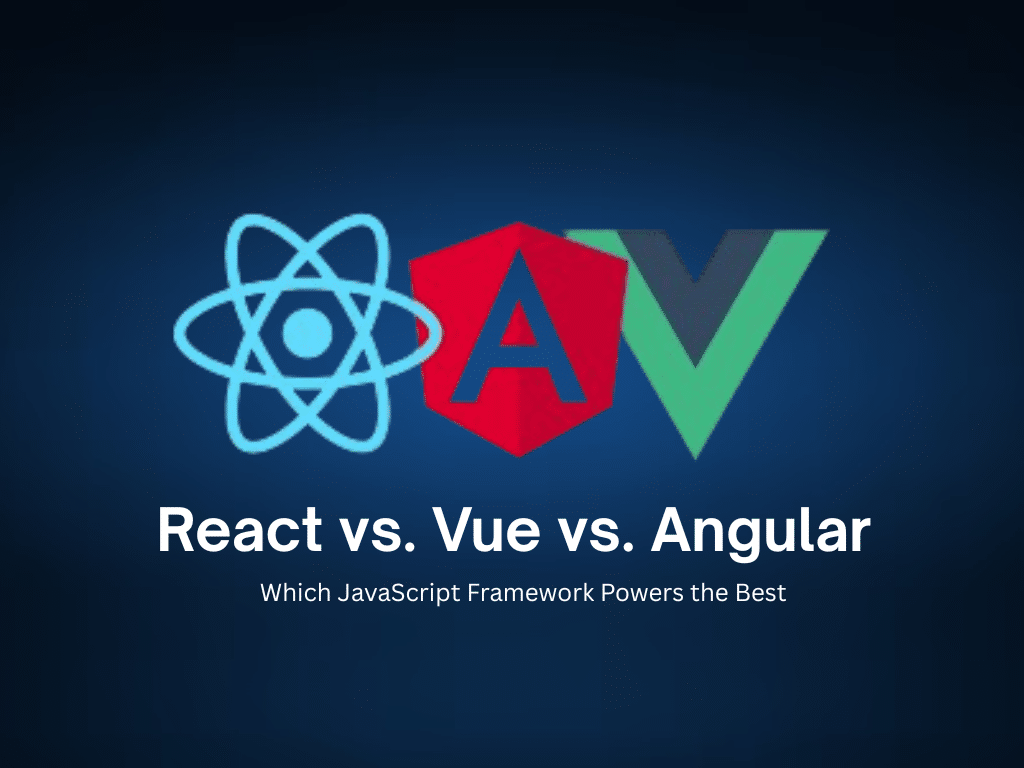React vs. Vue vs. Angular: Which JavaScript Framework Powers the Best Web Development Services?
We all know that JavaScript as a programming language, stands unmatched when it comes to front-end development for web applications.
However, the case is not the same with JavaScript frameworks.
With more than 24 frameworks and 83 libraries available for developers to choose from, it has always been a daunting task to select the right JavaScript framework as it greatly impacts scalability, performance, and maintainability.
Out of these numerous choices, three frameworks have emerged as big players in the front-end development world: React, Vue, and Angular. While these three JavaScript frameworks are highly popular around the globe, the best web development company prefers to use the most powerful one.
This blog intends to clearly explain the difference between React vs. Vue vs. Angular by comparing their advantages and disadvantages. At the end, we will help you find out which javascript framework powers the best web design & development company.
About React
React is an open-source frontend JavaScript library used for developing user interfaces based on components. It was developed by Facebook in 2013 and is currently maintained by the open-source community and Facebook. According to Statista, React is the second most used web framework among developers and web development services worldwide, followed by Vue and Angular.
Advantages of React
The main reason behind the rising popularity of React among businesses and web development company is the advantages it offers:
Better Performance: React uses virtual DOM, instead of conventional DOMS, which enhances the performance and increases the speed of the programs.
Reusable Components: The reusable components of React decrease the complexity and need of coding, offering better functionality and a clear code base.
Easy-to-Learn: React offers an easier learning curve as compared to Angular and Vue. Developers with knowledge of JavaScript and HTML can easily use it.
Disadvantages of React
Apart from the significant benefits it offers in web application development, React also comes with some notable disadvantages, such as:
Slow Rendering: Developers from the best web design & development company.
report that React takes time to render complex pages and UI elements.
Frequent updates: React is updated frequently which doesn’t leave much time for developers to document an organized approach for development.
No Specific Procedures: React doesn’t offer specific procedures or guiding principles for developers to follow, often confusing them and delaying the projects.
About Vue
Vue is an open-source progressive frontend framework that came into wide popularity for creating single-page applications (SPAs). It was released in 2014 and caught the attention of developers and web development company due to its straightforward interface and easy learning curve. Unlike other monolithic frameworks, Vue is designed with a dedicated focus on adaptability.
Advantages of Vue
Vue has made its name among the best JavaScript frameworks for web application development due to its numerous advantages, mainly including:
Short Learning Curve: Vue is beginner-friendly and does not require any specific prior skills. It has a gentle learning curve, making it usable for new developers.
Extensive Community: Vue has a strong support community, with several open-source libraries and tools available. This makes it easy to find help and support whenever needed.
Better Flexibility: Due to its unmatched flexibility, a web development company can use Vue either as a full-fledged framework or as a simple library for specific features.
Disadvantages of Vue
Although the advantages of Vue may feel intuitive and make it a better option, it is also important to consider its disadvantages before making a choice.
Limited Ecosystem: Vue has a very narrow ecosystem and, therefore it faces rendering issues in older versions of operating systems and web browsers.
Poor Reliability: Developers from different web development services consider Vue as a less reliable framework as compared to Angular and React.
Limited Scalability: Vue may not be as well-suited for large and complex web applications due to its limited scalability as compared to other frameworks.
About Angular
Angular is a full-fledged web application development framework that is free, open-sourced, and based on TypeScript. It is widely used by web development company around the globe to create single-page applications. It was initially launched by Google in 2016 as a sequel to AngularJS. Angular is known to create web applications that load faster and offer a smooth user experience.
Advantages of Angular
Similar to other JavaScript frameworks, Angular also comes with its own unique set of advantages making it different from the others. Its major advantages include:
Better Reliability: As Angular is backed by Google, businesses often rely on it for developing large-scale web applications to be used for the long term.
Detailed Documentation: The documentation of Angular is detailed and very well explains the functionality and workings of the framework, making it easier to use.
Large Ecosystem: Angular comes with a large array of tools and libraries for reactive programming and testing, offering an enhanced developer experience.
Disadvantages of Angular
While the advantages of Angular aside, there are some notable disadvantages that businesses working with a web development services company must consider. Such as:
Steep Learning Curve: Angular requires developers to be skilled in TypeScript. Therefore, the learning curve of Angular is more challenging than other frameworks.
Limited SEO features: Indexing Angular-based web applications in search engines is difficult because Angular has very limited options in terms of SEO.
Low Versatility: Angular is a less versatile framework as compared to others. It can be a challenge to create certain types of web applications with Angular.
React vs. Vue vs. Angular: A Comparative Analysis
React, Vue, and Angular are undoubtedly the most popular JavaScript frameworks among developers and website development services company for crafting innovative web applications. As these three frameworks come with their own unique pros and cons, it is essential to compare them based on different factors to choose the best one.
Here is a detailed comparative analysis of React, Vue, and Angular based on some important factors:
Popularity: Angular is a popular choice for enterprise applications, while Vue is more popular among start-ups and small businesses. React is largely used by well-established companies due to its extensive community.
Language: Angular uses TypeScript, a superset of JavaScript. React uses JavaScript. While Vue can use either JavaScript or TypeScript. Each language has its own advantages and disadvantages.
Ecosystem: Angular has an all-inclusive ecosystem but it can be heavy and complicated. React has a sizable ecosystem but requires extra libraries for specific tasks. While Vue’s ecosystem has various tools and libraries, it is not that vast.
Development Tools: Angular offers a wide range of IDEs and extensions, while React offers a smaller selection but still enough to create robust web applications. Vue also offers a good selection of IDEs and extensions.
Learning Curve: Angular has a sharp learning curve due to its complexity and extensive benefits. React has a moderate learning curve but its simplicity makes it effortless to learn. Vue has a gentle learning curve, making it the easiest to learn.
Performance and Memory: Angular is comparatively slower and uses more memory due to several built-in functionalities. React performs optimally and uses less memory. While Vue uses memory efficiently and delivers better performance.
Which One is Best for You?
When it all comes down to choosing the best one between React, Vue, and Angular, the choice actually depends on your business goals, project size, user demands, and the features needed. Considering these factors and analyzing the advantages and disadvantages of every framework will help you make a more informed decision.
While Angular is a full-fledged framework with a wide range of features, React is a lightweight library that is easy to learn. On the other hand, Vue is a progressive framework ideal for both small and large projects. A professional web development company can always help you identify the most powerful JavaScript framework.




